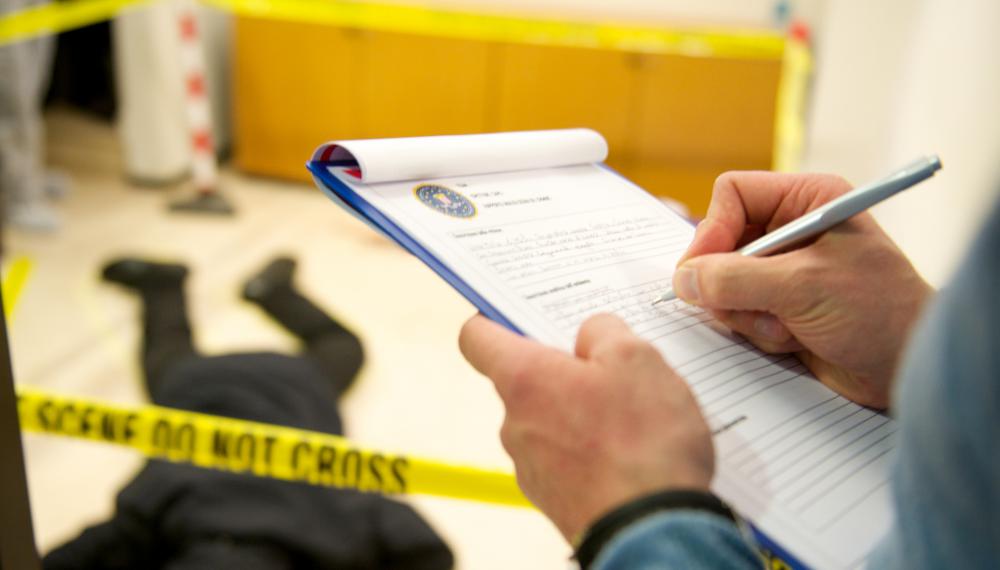At PracticalAdultInsights, we're committed to delivering accurate, trustworthy information. Our expert-authored content is rigorously fact-checked and sourced from credible authorities. Discover how we uphold the highest standards in providing you with reliable knowledge.
What does a Criminologist do?
A criminologist studies and analyzes human behavior with the ultimate goal of helping to reduce crime. He or she studies crime, criminals and the effectiveness of the criminal justice system. Crime is studied through a variety of academic lenses, including sociology and psychology, and at both the micro and macro levels. By studying normal and abnormal social behaviors, as well as patterns that lead to criminal activity, criminologists try to understand what causes people to commit illegal acts and what can be done to prevent crimes and capture criminals.
Role in Law Enforcement

Most criminologists work for law enforcement agencies, government organizations or educational institutions. When working in law enforcement, a criminologist tries to help reduce crime. He or she may work with police officers, with other criminologists, or alone, depending on the particular job and task. A criminologist might attend autopsies, help conduct crime scene investigations, perform psychological profiling or conduct other studies that can help him or her better understand criminals and their behavior.
Developing Theories

Another part of a criminologist’s job is to develop theories on why people deviate from socially accepted norms. They study statistics and specific cases, looking for similarities, patterns and trends in behavior. Criminologists also conduct research on whether the justice system is effectively reforming criminals. Among the issues and subjects they study are law reform, forensics, law enforcement tactics, juvenile delinquency and drug abuse.
Conducting Research

In many ways, a criminologist is more like a scientist or a scholar than like other employees in the criminal justice system. He or she thinks analytically and critically, can work with statistics, has a desire to learn about crime and knows about the psychological and sociological aspects surrounding abnormal activity. Criminologists read essays, check out studies and collect statistics to add to their knowledge of crime. They build upon this knowledge by compiling their own reports, which are then used to solve real-life problems.
Writing Reports

Working both statistically and analytically, a criminologist writes scientific reports and develops statistics that can be used to form the basis of laws, community initiatives, reform policies and crime legislation. Criminologists compile demographics such as who is most likely to commit crimes, where most crimes are committed, the effects of the justice system on criminals and whether criminals experience relapses after being reformed. The research the conduct might be published in journals devoted to criminology.
Educational Requirements

Criminologists are required to have bachelor’s degrees, preferably with majors in areas such as sociology, psychology, criminal justice or statistics. Many of them also earn master's degrees or doctorates, often continuing their education after beginning their careers. Some courses that are helpful in this profession include logic, statistics, computer science and writing.
AS FEATURED ON:
AS FEATURED ON:
















Discussion Comments
As long as you don't get killed, it's all good, right?
I think that criminologists have one of the most interesting jobs currently available for those interested in the reasons behind why crime happens. They do so many in-depth studies into the social and environmental conditions that produce criminal behavior, I think they must have some great insight into what makes the human mind work.
I imagine it must be fascinating to have such a close look at abhorrent behavior in society and go about figuring ways to stop it, sometimes even before it happens.
I love this article. But several people are telling me this job is not as great at it is shown on TV shows, but I would hate to let go of something that might be my passion because of what others say. I would like to get more insight from someone who is actually involved with all of this.
So do they have to be with the criminals at any time at all?
I think the criminologist's salary is very attractive, and would love to be a crime scene investigator. My family keep telling me it's not as glamorous as it is portrayed on TV, but I'd still like to try it.
@letshearit - I graduated with a criminology degree, and I agree that it is a fascinating subject to study.
There are many careers in criminal justice available for graduates. What surprises people is that most of them are not in the forensic criminology field. I guess TV has popularised that aspect, and overlooked everything else!
To be a true criminologist is rare. Many of us work in a field loosely related to deviance, though I know a fair few people who do something totally different.
Becoming a criminologist requires a lot of work and education. My friend is currently pursuing a career in law enforcement, and many jobs require the minimum of a master’s degree in the subject. Plus, you also need to have experience in the field doing research. Whether this be working with local police or interning at a place like a penitentiary.
The salary for this job is quite good with the median income sitting around $68,570USD a year. Top professors and analysts with the FBI can make over $100,000 a year.
I think if you are truly passionate about this as a career you should pursue it.
I think that criminologists have one of the most interesting jobs currently available for those interested in the reasons behind why crime happens. They do so many in depth studies into the social and environmental conditions that produce criminal behavior, I thin they must have some great insight into what makes the human mind work. I imagine it must be fascinating to have such a close look at abhorrent behavior in society and go about figuring ways to stop it, sometimes even before it happens.
Many popular crime shows on television today feature individuals doing the work of a criminologist. TV shows though, rarely give them that title, instead the focus on their analyzing of criminal behavior and how intense profiling is.
Post your comments